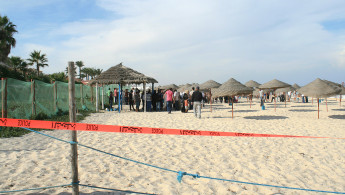Many dead in shooting on Tunisia tourist beach
Two gunmen opened fire on a Tunisian beach near hotels in the coastal resort city of Sousse, with reports suggesting at least 28 people have been killed.
2 min read
Sousse is a popular resort for both Tunisians and Europeans [Anadolu]
At least 28 people have been killed and 36 wounded after two gunmen opened fire on a Tunisian tourist beach on Friday afternoon, according to local reports.
Many of the victims are thought to be tourists, as the attack hit a popular area near two hotels in the coastal resort city of Sousse, Tunisia's Interior Ministry said.
One of the gunmen was killed, and police are pursuing the second, said Interior Ministry Spokesman Mohammed Ali Aroui.
Secretary of State for Security, Rafik Chelly, said one of the attackers was a Tunisian student originally from the Kairouan region and previously "unknown to police".
"He entered by the beach, dressed like someone who was going to swim, and he had a beach umbrella with his gun in it. Then when he came to the beach he used his weapon" Chelly added.
Sousse, some 150 kilometres south of capital Tunis, is a popular resort for both Tunisians and Europeans.
A British tourist close to the scene of the attack described his experiences. Gary Pine said he was on the beach and heard what "we thought was firecrackers going off" around 100 metres away, followed by an explosion from a nearby hotel complex.
"There was a mass exodus off the beach," he told Sky News, adding that his son had seen "someone get shot on the beach".
The tourist also said that guests at his hotel were first told to lock themselves in their rooms, and later to gather in the lobby.
"People were exiting the beach pretty quick. We're all looking up thinking, what do we do, what is it, but only when you could start hearing bullets whizzing around your ear do you realise it was something a lot more serious than firecrackers" Pine said.
The tourist area was later completely sealed off by security forces, a witness told AFP.
The French embassy in Tunis, in an SMS message, urged its nationals to be vigilant and to "limit travel and avoid gatherings".
French President Francois Hollande and his Tunisian counterpart Beji Caid Essebsi both expressed their "solidarity in face of terrorism", a French statement issued in Paris said.
Essebsi said Tunisia "cannot face jihadists alone" and wants a "global strategy".
Tunisia has been a target of militant groups, most recently in March when two Tunisians returning from Libya killed 22 people at the national museum in the capital.
Many of the victims are thought to be tourists, as the attack hit a popular area near two hotels in the coastal resort city of Sousse, Tunisia's Interior Ministry said.
One of the gunmen was killed, and police are pursuing the second, said Interior Ministry Spokesman Mohammed Ali Aroui.
| There was a mass exodus off the beach - Gary Pine, British tourist |
Secretary of State for Security, Rafik Chelly, said one of the attackers was a Tunisian student originally from the Kairouan region and previously "unknown to police".
"He entered by the beach, dressed like someone who was going to swim, and he had a beach umbrella with his gun in it. Then when he came to the beach he used his weapon" Chelly added.
Sousse, some 150 kilometres south of capital Tunis, is a popular resort for both Tunisians and Europeans.
A British tourist close to the scene of the attack described his experiences. Gary Pine said he was on the beach and heard what "we thought was firecrackers going off" around 100 metres away, followed by an explosion from a nearby hotel complex.
"There was a mass exodus off the beach," he told Sky News, adding that his son had seen "someone get shot on the beach".
The tourist also said that guests at his hotel were first told to lock themselves in their rooms, and later to gather in the lobby.
"People were exiting the beach pretty quick. We're all looking up thinking, what do we do, what is it, but only when you could start hearing bullets whizzing around your ear do you realise it was something a lot more serious than firecrackers" Pine said.
The tourist area was later completely sealed off by security forces, a witness told AFP.
The French embassy in Tunis, in an SMS message, urged its nationals to be vigilant and to "limit travel and avoid gatherings".
French President Francois Hollande and his Tunisian counterpart Beji Caid Essebsi both expressed their "solidarity in face of terrorism", a French statement issued in Paris said.
Essebsi said Tunisia "cannot face jihadists alone" and wants a "global strategy".
Tunisia has been a target of militant groups, most recently in March when two Tunisians returning from Libya killed 22 people at the national museum in the capital.





 Follow the Middle East's top stories in English at The New Arab on Google News
Follow the Middle East's top stories in English at The New Arab on Google News


